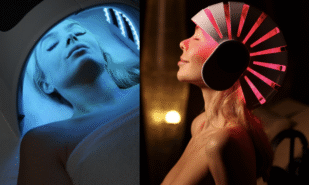Indeed, “Player Kings” is a actor’s benefit for Ian McKellen. A Shakespearean actor, who has seemingly played every Shakespearean role including Hamlet and King Lear, has long resisted Falstaff—yet here he finally is, persuaded. “Player Kings” merges two Shakespearean chronicles, “Henry IV, Part 1” and “Henry IV, Part 2.” This approach isn’t new, not devised by director Robert Icke, but it fully meets the play’s objective. The world in this part of the chronicle is collapsing, and within it remains a single island of stability. This island sits in a floral-patterned chair, wrapped in a robe that doesn’t close, drinking, laughing, and joking—Sir John Falstaff, as performed by Ian McKellen.
The Meaning of Life. Ian McKellen Plays Falstaff at the Noël Coward Theatre
On stage, brick walls rise, resembling the labyrinth of Knossos more than palace chambers. Throughout the play, they are either bathed in light or obscured by heavy velvet curtains. The three and a half hours of this monotonous space seem to convey to the audience that there is no hope of ever ending all this struggle for power, no hope of stopping those who love to attack, kill, conquer, and fight for the throne. Almost all historical details are omitted: Icke is not interested in them, but in human relationships. No, there are no parallels here; it is simply a standard and terrifying situation that has arisen throughout the centuries—a sharp political and social idea is absent in the play. There is only enduring horror and hopelessness.
But fortunately, in this cold brick world, there is Falstaff.
A fat, dirty, drunk Falstaff.
A merry, cunning, life-loving Falstaff.
This Falstaff certainly knows the meaning of life. Let these fools, these ignoramuses and brutes, lay their heads on the road, let something explode, bang, scream, and disgustingly squeal—it does not bother him at all.
From any fight, he emerges—not as a victor, no, how boring!—he emerges alive. Alive! That is far, far more important.
But wait, here he dies at the end of the first act, having participated in one of the battles? Killed, what a grief! A countertenor mournfully tolls, lamenting the fallen. The curtain closes, leaving behind the lifeless body of the knight, resembling a huge sea lion—which then suddenly laughs, snorts, killed, indeed! Not so fast! He jokes, waking up from his feigned eternal sleep. This world may press down on Falstaff as much as it wants, but he will slip away, saved—to the delight of the audience.
He is a braggart, a coward, a debauchee, but all this morality, leading to agonizing death for honor, doesn’t attract him at all. Honor is but a mere escutcheon – this unpopular point of view, however, helps him survive—and we are all a bit this John Falstaff, a shameless type. Can honor be set to a leg? No.
He plays physiology, completely unpretentious, without a drop of caricature, with some kind of simple, unpretentious coziness. He snores, smacks his lips, even grunts occasionally, comfortably settling in the corner of a shabby pub. He wears a fat suit but McKellen moves in it very naturally.
This special superstitious sense of wonder, familiar to anyone who frequents the theater, arises when you watch McKellen. Lucky to see a great artist. It’s strange, it’s exceptional—but it is what it is.
Watching McKellen, one of the greatest living actors, you forget to breathe. Here’s his funny drunkard’s gait, uncertain and sluggish, here he fools around, falls into a chair, stands surrounded by similar scoundrels. But suddenly—as if a dazzling beam of light splits the darkness—from the stupor of vulgarity arises a sober, warm, and understanding gaze, the voice strengthens, the walk changes. For a moment, a calm Adult emerges in this cowardly life-lover—and immediately it is clear why Hal is so attached to him.
This role may not be viewed in isolation from all of McKellen’s acting work, both theatrical and cinematic. For instance, this Falstaff in some ways echoes Gandalf. This image—a parental figure, with Falstaff becoming such for Prince Hal, who has lost any possibility of remaining a son to his father, King Henry IV. Falstaff is a rather poor father, true. What can he teach this poor lambish boy? To sniff various substances while standing bare-bottomed (come on, viewer, don’t cringe, what else in a brothel)? To drink? To hug prostitutes? Well, if one must choose between murder and drinking…
Throughout the stage passes a panoptium of unfortunate people, maimed by war, hatred, fear, and constant compulsion to fight.
The division of the world of “the palace” and “the pub” is resolved by costumes and lighting. Mistress Quickly (Clare Perkins) — leather skirt, large bright earrings — the owner of the “Boar’s Head,” grasping, agile, firmly grounded, very cozy, very real — a little-known to the layman but beloved by Shakespeare character, wandering from play to play with Falstaff. Here are two who understand each other well!
And here’s Hal (Toheeb Jimoh), lost, unhappy, nervous, almost ready to give up his soul to God, suffering from a morning hangover.
Ice-cold Harry Hotspur (Samuel Edward-Cook), resembling an ideal killer — ever fresh, ready, disciplined, clad in a military green sweater as if it were not part of a uniform but the skin of an unknown dragon.
And here’s Henry IV, so well-mannered, with such impeccable manners (Richard Coyle), surrounded by courtiers in strict dark suits, struggling to maintain composure, spending all his strength not to show his disarray.
Who will win in this meat grinder? Are you still doubting? Of course, Falstaff! Certainly, this deceiver and blabbermouth, hedonist, and fabulist.
A war hero (oh, come on, stop lying!..), with a thriving business, in an expensive tie, with medals on the lapels. And as for the wheelchair — well, he only rejoices to concoct a marvelous story of his own recovery.
But it would be strange to think that the image of Falstaff as portrayed by McKellen is painted in one stroke. Everything is much more complicated and tangled, like the aiguillettes on the uniform chest of Henry IV.
The icy cold and strict cleanliness of the palace scenes—are they the breath of death? Or is the warm pub “Boar’s Head,” where reflections dance on the walls from the roaring fireplace, the gates of Hell?
With an increasing rumble, apples fall—the sound from their fall is like distant explosions. But how to recognize the Forbidden Fruit among hundreds of others, and finally, how many of those apples did the gluttonous Falstaff eat? And what did he learn? Only evil? There will be no answer.





